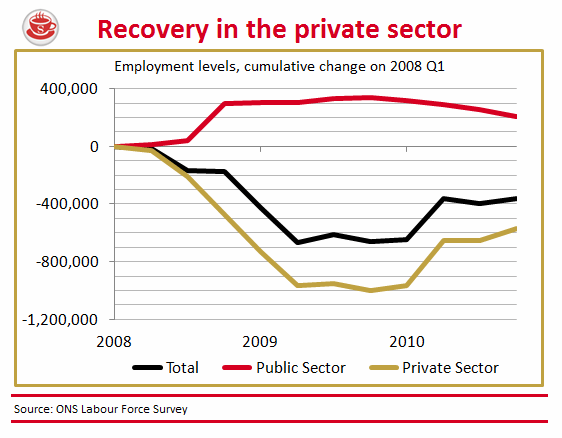It is almost a cliche to describe jobs figures as a “mixed picture” — and yet that’s exactly what today’s are. Beneath the headline finding that the number of unemployed people has risen above 2.5 million, are numbers that will fuel not only David Cameron’s happiest dreams, but also his most paranoid nightmares. Let’s start with the nicer stuff first.

The graph above shows the cumulative change in employment levels since the recession started to take hold in 2008. What it shows is something that often goes ignored: that is was the private sector, not the public sector, that took the greatest hit from the crunch. At the depth of the recession, in 2009, around a million private sector jobs had been lost, whereas around 400,000 extra public sector jobs had been created, even if this was due in large part to the reclassification of the Royal Bank of Scotland and Lloyds as public sector agencies. Even now, there are 209,000 more public sector jobs than there were in the first quarter of 2008.
What Cameron will be encouraged by is how this picture has changed since the beginning of 2010, not least because the number of private sector jobs is now increasing. Indeed, today’s figures show
that, in the last quarter, the growth in private sector jobs (77,000) actually outweighed the decrease in public sector jobs (45,000). As a result, overall employment levels rose by 32,000. This
graph should make it a little clearer:

In other words, this is the recovery writ black-and-white in official statistics. Cameron can point to these numbers and say, “There’s your growth, and its coming in exactly the sector that
will pull us out of the economic mire!”
And yet this is where his nightmares also sashay in. Despite these encouraging signs, unemployment is also rising. Which is to say: the private sector may be hiring again, but the dole queues are lengthening regardless. What explains this odd discrepancy? A number of factors, in truth — although one is certainly immigrant labour. The number of non-UK born workers increased by 192,000 over the first three quarters of 2010, and they accounted for 7,000 of the 32,000 net increase in jobs in the last quarter. This is no bad thing in and of itself. But it does mean that British workers are missing out:

As it stands, this is David Cameron’s own version of the jobless recovery — only the concern is more about who is being left jobless, than whether there are jobs available. Left unchecked, these unforgiving trends could damn his premiership. Which is why the coalition doesn’t plan to leave them unchecked. The DWP’s Work Programme and IDS’s universal credit will kick in over the next few months and years, to ease the path from worklessness to work. A bitter shame that people are being left behind in the meantime.






Comments